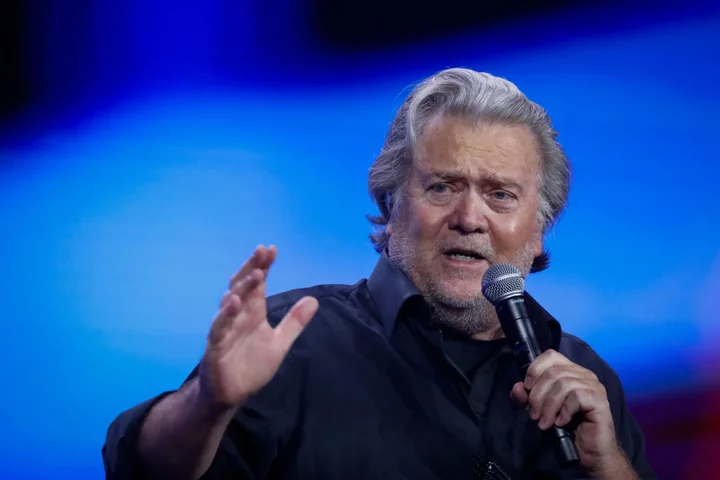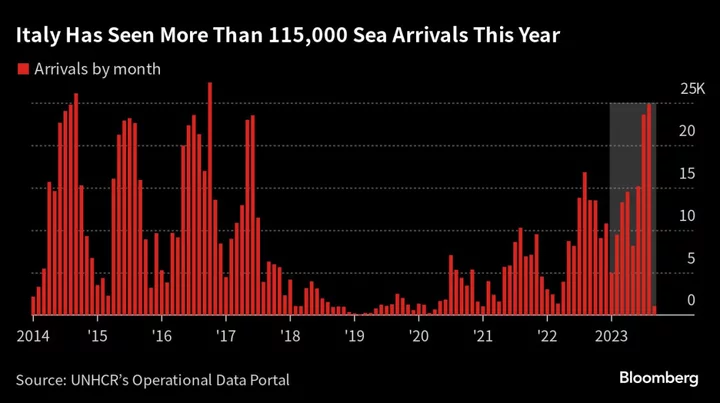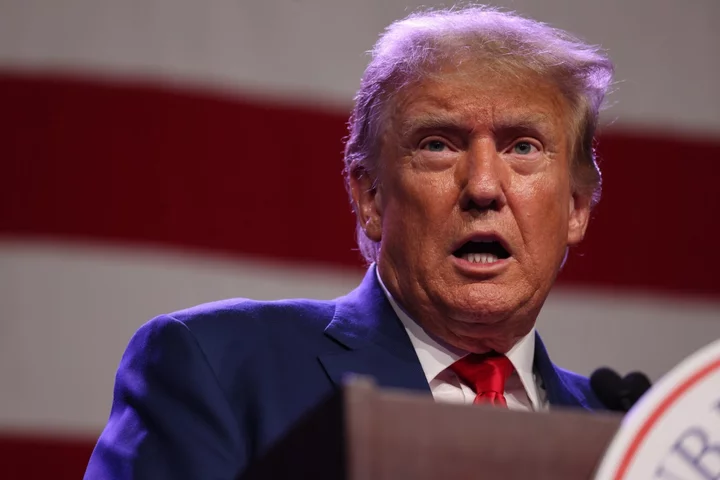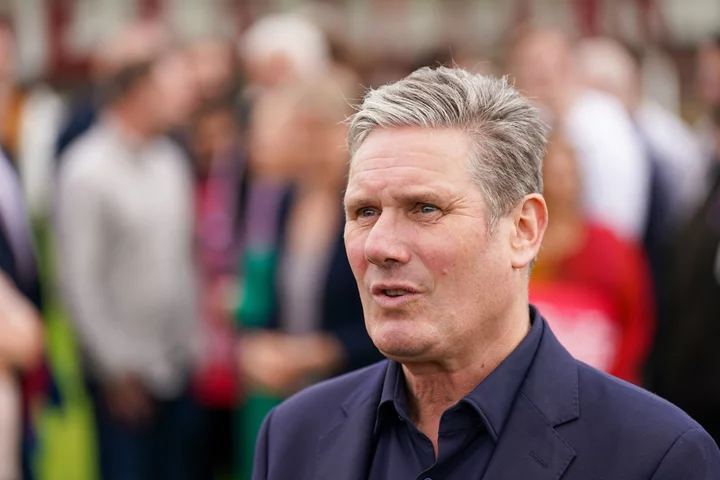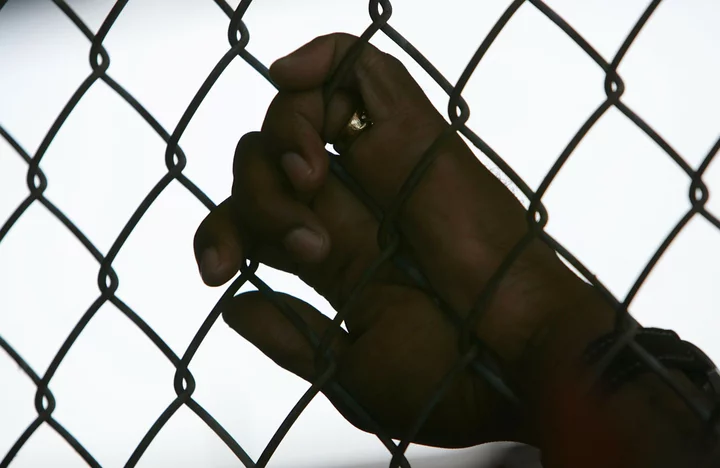If Donald Trump returns to the White House in 2025, he’ll bar babies born in the US from automatically claiming citizenship, ban transgender people from the military, hold elections for school principals and swiftly end the war in Ukraine.
That’s according to Trump himself, who has made no secret of his intentions as he campaigns to challenge President Joe Biden.
His plans, shaped by a group of firebrand allies from his first term, also include ousting scores of civil servants in the national-security and law-enforcement establishment and ordering the Justice Department to criminally investigate his predecessor.
Outside of his devoted followers, Trump’s second-term ambitions likely aren’t widely known. His stump speeches and rallies routinely begin with a long recitation of his grievances toward political enemies and the prosecutors pursuing him on sundry criminal charges. By the time he gets to his actual plans, TV networks (and sometimes even his in-person audience) have often tuned out.
For those with the patience to hear him out, however, Trump has started to go deep in his own policy weeds. Many of his proposals would likely face court challenges; others would be difficult to pass through Congress.
“He is throwing down a lot of policy and nobody is picking it up,” Trump’s former strategist Steve Bannon, who is once again advising him, said in an interview. “There’s a bunch of think tanks, three or four working groups, and a number of other vectors all coming together. The second term is being put together right now.”
Far-Right Advisers
A coterie of aides and informal advisers from the fringe of the Republican Party are advising Trump on his policies.
They include Roger Stone, who recently traveled on Trump’s plane with him to Iowa; Michael Flynn, the retired general who was briefly Trump’s national security adviser; Stephen Miller, the former Trump adviser who championed his most aggressive and controversial anti-immigrant measures; and Bannon, who fell out of Trump’s favor but, in the final hours of his first term, secured a pardon that ended the strategist’s prosecution on federal fraud charges.
Flynn was also pardoned by Trump after pleading guilty to lying to the FBI, and Trump commuted Stone’s 40-month prison sentence on charges stemming from the investigation of Russian interference in the 2016 election.
Trump’s plans include an upheaval of federal law enforcement, even as he and several close advisers confront a growing raft of legal challenges. Trump recently received a target letter from the special counsel investigating efforts to overturn the 2020 election, Jack Smith, who has already charged him with mishandling classified information after he left office.
Bannon was found guilty last year of contempt of Congress and faces four months in prison, a ruling he is appealing.
If he wins in 2024, Trump is expected to end all federal prosecutions of himself and his supporters and advisers.
At the heart of the Trump policy-development process are two aides and former White House speech writers, Vince Haley and Ross Worthington. They are assisted by think tanks formed by Trump administration alums including the America First Policy Institute — stacked with former officials including Larry Kudlow, Kellyanne Conway, Brooke Rollins and Keith Kellogg — and the Center for Renewing America, helmed by former top budget official Russ Vought.
One of the former president’s allies called AFPI the Trump world’s shadow government.
A handful of people at the conservative Heritage Foundation are also involved, including John McEntee, Trump’s former body man turned head of White House personnel. McEntee spent his final months of the administration trying to root out officials deemed insufficiently loyal.
White Appeal
The policies Trump and his team are devising draw from the former president’s own anger toward so-called “deep state” bureaucrats he believes stymied his first-term ambitions, as well as hostility among White conservatives toward education and social movements intended to support racial diversity and gender identity.
Trump recently told a conference of far-right moms that he’d do away with the Department of Education entirely and have parents elect principals. Trump says he’d ask Congress to pass a law recognizing only male and female genders.
He also wants to increase tariffs on China by the billions, deploy the US Navy to help fight drug cartels and build more of the wall between the US and Mexico that his first administration couldn’t finish.
Former Trump economic adviser Steve Moore said he’s scheduled to meet Trump soon to brainstorm ideas for contrasting his economic record with Biden’s. Moore says Trump should zero in on how much middle-class families’ bills have risen under Biden due to inflation.
Trump says he would immediately “settle” Russia’s war in Ukraine, without elaborating. In one video, he calls it a “lie” that “Russia represents our greatest threat.”
Trump’s 2016 campaign was guided more by his own instincts, but his 2024 run is a better-managed affair, including professionally produced, presidential-looking policy videos, shot at his golf clubs, that are catalogued in a section of his campaign website called “Agenda47.”
Trump would be the 45th and 47th US president if he’s returned to the White House.
“Never before in the modern era have you had someone looking to take the White House that has such a firm set of policy objectives,” his senior campaign adviser Jason Miller said in an interview.
Former Trump officials say he’d issue a fresh executive order taking aim at bureaucrats believed to be so opposed to his policies that they would quietly thwart his directives. Trump signed an order in October 2020 creating a class of federal employees called “Schedule F” that would have no civil service or union protections, making them easier to fire. President Joe Biden rescinded it.
“I would be shocked if two-thirds of non-political appointees in the Justice Department are not forced out in the first 100 days” after Trump returns to office, Bannon said. “There’s going to be a purge of this corrupt apparatus. These radicals inside Justice, FBI, and CIA are going to be gone.”
Trump’s Unpopularity
About 56% of Americans maintain an unfavorable opinion of the former president, according to an analysis by FiveThirtyEight. That figure hasn’t dipped below 50% since Trump left office and increased by almost 3 points since May, as the GOP primary contest has accelerated.
“We’ve heard it all from Trump himself: his agenda would immediately start rigging the economy for the country’s wealthiest and stifle our domestic manufacturing boom at the expense of the middle class and he’d push to ban abortion nationwide,” said Jaime Harrison, the Democratic National Committee chair.
The Trump team wants its focus on policy to draw a distinction with other Republican candidates including Florida Governor Ron DeSantis, who has centered his campaign around his popularity in his home state and culture-war issues.
Trump is also attempting to cast himself as the inevitable nominee and pivot toward Biden. It’s working so far. DeSantis, his closest challenger, remains about 30 points behind in primary polling.
Author: Nancy Cook, Joshua Green and Stephanie Lai

